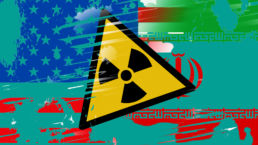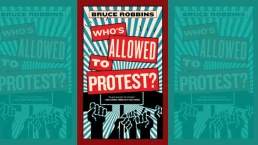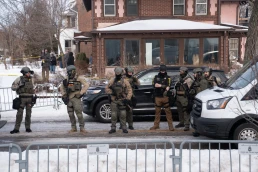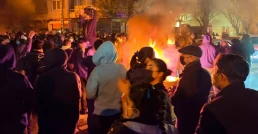The Iran Nuclear Deal (JCPOA) is in the interest of both the American and Iranian people. It’s time to reduce the threat of violent conflict and alleviate the suffering of regular Iranians.
By Hanieh Jodat & Charles Lenchner
Iran has been a thorn in the side of the American foreign policy establishment for over 40 years, since the revolution of 1979. Every time we see “JCPOA” show up in the mainstream news we have to remind ourselves that the general public, even most progressive consumers of elite news, are unlikely to really understand either what is actually happening or the history of how we arrived at the current moment. Let’s try to fix that, before another war breaks out.
JCPOA is an acronym that means ‘the Iran nuclear deal’ signed between Iran and the U.S., France, Germany, UK, Russia, China, and the European Union. Basically the permanent members of the UN Security Council, with the addition of Germany and the EU. It was signed in 2015 and does two things: it subjects the Iranian nuclear program to international oversight designed to delay or prevent the development of nuclear weapons technology, while lifting some of the extreme sanctions against Iran and thus allowing its people greater access to basic goods like food and medical supplies.

Western media have accustomed the public – especially our politically literate public – to assume that the issue of Iran is primarily about the threat it poses with continuous saber rattling, eagerness to possess nuclear missiles, and active participation in wars in the Middle East, ranging from Iraq to Syria to Yemen. We need to be reminded that Iran isn’t simply an international bogeyman, it’s a large country with a unique history (2,500 years!) and a fiercely independent people. Let us be clear that Iran, like any other country, has the right to exist without foriegn interference.
We know that the Iranian regime is guilty of many things, from human rights violations to not allowing free and fair elections. The U.S. policy of escalating tensions makes it easier for Iran to ignore those concerns as long as those sanctions are causing even greater harm to more people.
The Missing Word: Imperialism
When the Shah of Iran was overthrown in 1979, the monarchy was replaced by the current Islamic Republic. That led to a sudden shift from a deep alliance with the United States and Israel, to open hostility towards those two countries which did so much to support the Shah and protect his rule. It can be hard from today’s vantage point to realize the intense turmoil inside Iranian society, colored as always by the open support for the Shah from the United States and Israel. The vast majority of Iranians do not want the U.S., or any other country, to interfere in their development.
Where the mainstream media will begin the narrative with Iran’s alleged misbehavior around nuclear weapons, we should remember that the story doesn’t begin there. The story includes a U.S. coup against a popular leader (Mosadeqh) in 1951, a U.S.-backed war against Iran that Iraq launched in 1980 that lasted for eight years, and decades of sanctions that have led to enormous suffering.
We want the JCPOA to be a framework for a historic compromise that removes any possibility of Iranian nuclear weapons from the table while allowing Iran to be part of the international community with full rights. But powerful forces, especially in the U.S. and Israel, as well as Saudi Arabia, aren’t working towards the same goal.
So what do those powerful forces want from Iran? First of all, they want to ensure that American, Saudi, and Israeli dominance in the region will continue unabated. Secondly, they want to enhance business opportunities for select industries, but especially oil and weapons. And thirdly, they want to achieve other political goals (in Yemen, Syria, Lebanon, Palestine) that will be easier once Iran no longer exists as an opposing political force in the region.
Our Relationship With Iran Needs A Reset
The problem with American policy in Iran, the Middle East, and the rest of the planet isn’t “not enough interference.” It’s that the United States spends hundreds of billions of dollars to dominate faraway places in pursuit of goals that are meaningless to the vast majority of U.S. citizens. We represent the portion of society that seeks improved relations with the Iranian people – that seeks to end the suffering inflicted by indiscriminate sanctions. The movements in Iran fighting for democracy and human rights will thank us.
Hanieh Jodat is an Iranian-American organizer, the Partnerships Coordinator with RootsAction, and the President and co-founder of Muslim Delegates and Allies.
Charles Lenchner is a veteran political and communications consultant currently working for RootsAction, and part of the editorial team at ProgressiveHub.net.
Recent Posts
Everyone Is Allowed To Protest
February 13, 2026
Take Action Now Tied up with the apparently very longstanding tradition of claiming that all opponents of atrocities are purely engaged in what has…
Abolition Is Still The Only Way Out Of This
February 13, 2026
Take Action Now Forget the useless so-called “reforms” to ICE and policing currently on offer. We need much more fundamental change.By Andrea J.…
Leading Papers Call For Destroying Iran To Save It
February 11, 2026
Take Action Now The opinion pages of the New York Times and Washington Post are offering facile humanitarian arguments for the US to escalate its…
Despite Marco Rubio’s Warnings, This is the Time to Go to Cuba in Solidarity Against the Latest U.S. Aggressions
February 10, 2026
Take Action Now When visiting Cuba, one can see quickly the terrible effects of the almost seven decades of the U.S. economic blockade of Cuba.By…




